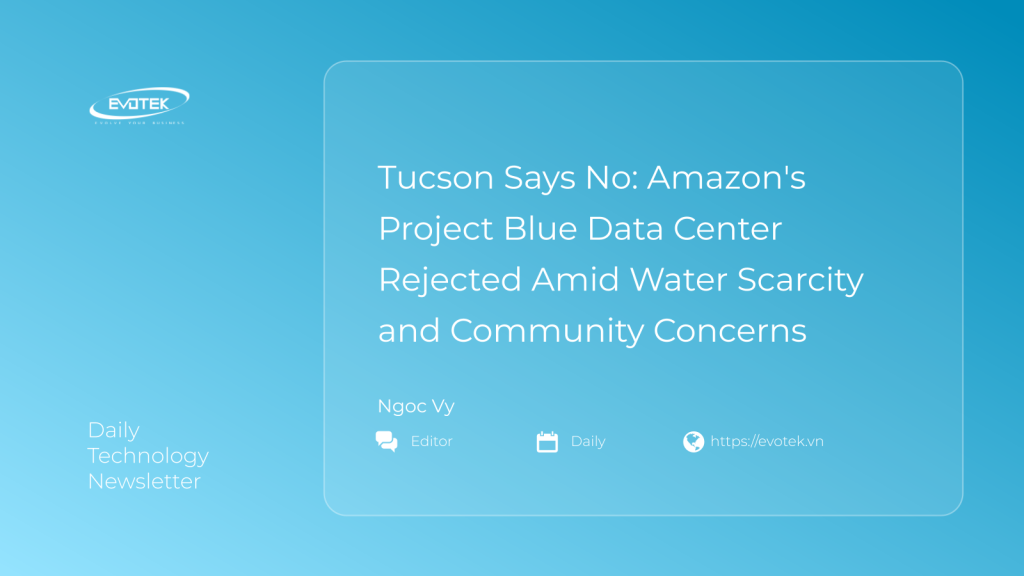In a significant victory for local residents and environmental advocates, the Tucson City Council has unanimously voted to reject Amazon’s proposed “Project Blue” AI data center campus in Arizona. The decision, met with cheers from the community, underscores growing concerns over resource allocation and transparency in large-scale industrial developments.
A Unanimous Decision: Tucson Stands Firm
On August 8, 2025, Tucson Mayor Regina Romero affirmed the city’s commitment to protecting its resources, stating that the council would also explore measures to limit future data center developments in the region. This stance aims to safeguard Tucson from an industry that is rapidly expanding its footprint across Arizona.
Project Blue’s Ambitious Scale and Hidden Details
The rejected Project Blue, spearheaded by development firm Beale Infrastructure (owned by Blue Owl), was an ambitious plan set to transform a 290-acre site. Initial designs called for three data center buildings, with long-term reports suggesting an expansion to up to ten buildings, encompassing two million square feet (185,805 sqm) and requiring an estimated 600 megawatts (MW) of power.
Amazon Web Services’ (AWS) involvement, initially undisclosed, was accidentally revealed to a local publication, Arizona Luminaria, sparking criticism over the project’s secrecy. Discussions among local officials dated back to at least 2023, with Pima County operating under a non-disclosure agreement (NDA) since June 2024, further fueling public distrust regarding transparency.
The Critical Water Debate in a Drought-Stricken State
A primary point of contention for Project Blue was its proposed water usage. The plan outlined the use of drinking water for its cooling systems during the initial two years of operation. Subsequently, the facility would transition to using treated wastewater once a new water line, combining reclaimed water with previously contaminated water from a Superfund site, was completed.
This proposal came at a sensitive time for Arizona, a state grappling with a severe and prolonged drought. Recent legislation has been enacted to restrict water usage statewide, making the prospect of a massive data center consuming significant water resources particularly controversial.
Community Voice: “No Desert Data Center” Leads the Charge
The formidable local opposition group, “No Desert Data Center,” played a pivotal role in mobilizing residents against the project. Their campaign highlighted critical issues such as the extensive water consumption and the potential environmental impact on the sensitive desert ecosystem.
Following the council’s decision, the group released a statement hailing the rejection as a “huge victory for our desert community.” They praised Mayor Romero and the council for “standing strong and not folding to Beale’s intimidation tactics and greenwashing propaganda.” The statement emphasized Tucson’s “right decision to halt Amazon’s harmful data center” to protect precious water, air, and ensure a livable climate, also vowing to remain vigilant against future attempts by large corporations to introduce similar projects within their watershed.
Looking Ahead: Policy Shifts and Unclear Futures
The rejection of Project Blue has broader implications beyond this single development. It was reportedly the first of three planned data center projects in the region, with others slated for Tucson and Marana. The current status of these additional developments remains uncertain in light of the council’s firm stance.
Developer’s Perspective: A Missed Economic Opportunity
In response to the decision, Brendan Gallagher, SVP of Development at Beale Infrastructure, expressed disappointment. He stated that the company had “partnered closely with municipal engineering teams and Tucson Water to develop plans directly compatible with Tucson’s Climate Action and Adaptation and One Water plans.” Gallagher framed the outcome as a “missed opportunity” for the city, citing potential benefits such as tens of millions in tax revenue, hundreds of millions in community infrastructure, and thousands of high-paying local and union jobs.
This landmark decision in Tucson serves as a powerful precedent, highlighting the growing friction between technological expansion and environmental stewardship, particularly in regions facing acute resource challenges like water scarcity.

 日本語
日本語 한국어
한국어 Tiếng Việt
Tiếng Việt 简体中文
简体中文